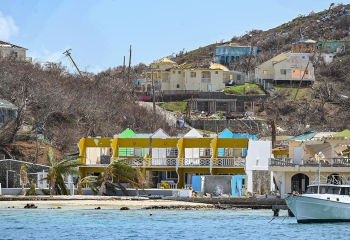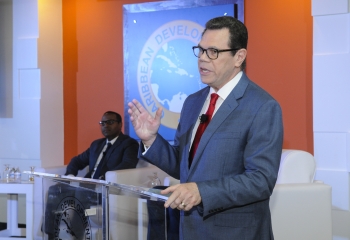Results in Focus as Caribbean Development Practitioners Meet in Barbados
Up to a decade ago, most development agencies were only required to report on the actions they were taking, through donor funding, to reduce poverty. Today, these agencies are now required to provide evidence that public funds have led to measurable, sustainable results.
After a week of training in Barbados from November 9-13, 30 officials from governments and statutory institutions around the Caribbean Region are returning to their jobs better equipped to define, monitor, and report on the results of their work in economic and social development, in accordance with global best practices.
The group, hosted by the Caribbean Development Bank (CDB), received training in Managing for Development Results (MfDR). MfDR is the management strategy used by development agencies around the world, which aims to improve transparency, accountability and effectiveness in development. MfDR entails strategic planning, performance measurement and management, with a strong focus on results.
“The Caribbean Development Bank has embraced a culture of MfDR, internally and externally, as we work with partners to deliver projects and programmes that aim to reduce poverty across the Caribbean Region," said Edward Greene, Division Chief, Technical Cooperation Division.
“Bringing together key players from our cooperating institutions for this workshop is just one of the ways in which CDB is working toward mainstreaming MfDR throughout our Borrowing Member Countries," he said.
Edward Greene, Division Chief, Technical Cooperation Division, CDB, delivers remarks during the opening of the training workshop on Managing for Development Results in Barbados, hosted by CDB.
The Centre for International Development & Training at the University of Wolverhampton in the United Kingdom facilitated the workshop. It was attended by officials from institutions that collaborate with the CDB' Caribbean Technological Consultancy Services Network to provide technical assistance for the development of Micro, Small and Medium-sized Enterprises (MSMEs) in the Bank' Borrowing Member Countries.
During the workshop, participants learned how to better integrate gender reporting into projects. They explored programme and project thinking tools, which can be applied in MfDR, and were trained in designing and working with results monitoring frameworks. The training was intended to equip participants with knowledge and skills to train other MSME development partners in their respective countries.
Thirty officials from governments and statutory institutions around the Caribbean Region attend the training workshop on Managing for Development Results in Barbados.
“I think it [the results framework] is a very simple, interactive tool that can help us focus on development projects in a more logical manner. It looks like a difficult process but it is really a simple process if we understand what we are doing," said Junia Emmanuel-Belizaire, Commerce & Industry Officer, Ministry of Commerce, Business Development, Investment & Consumer Affairs, Saint Lucia.
“The workshop has been very enlightening. The tools that we were taught about over the week can be very beneficial to us in getting funding," added Kirk Dottin, Business Development Manager, Fund Access in Barbados.
MfDR aligns with CDB' Results Monitoring Framework, a tool to help guide and measure progress in achieving results in the Bank' strategic objectives.
“CDB has embraced Managing for Development Results to improve our development effectiveness. Over the last few years, we have been building a stronger results culture by training staff, developing information systems and tools to collect meaningful information, and using this information to improve planning going forward," said Monica La Bennett, Deputy Director, Corporate Planning Division, CDB during the opening of the workshop.
Monica La Bennett, Deputy Director, Corporate Planning Division, CDB, tells participants how CDB has been building a stronger results culture, during the workshop.
Thirteen countries were represented during the weeklong training event: Anguilla; Antigua; Barbados; British Virgin Islands; Dominica; Grenada; Guyana; Montserrat; Nevis; St. Kitts; Saint Lucia; St. Vincent; Suriname; and Trinidad and Tobago.




